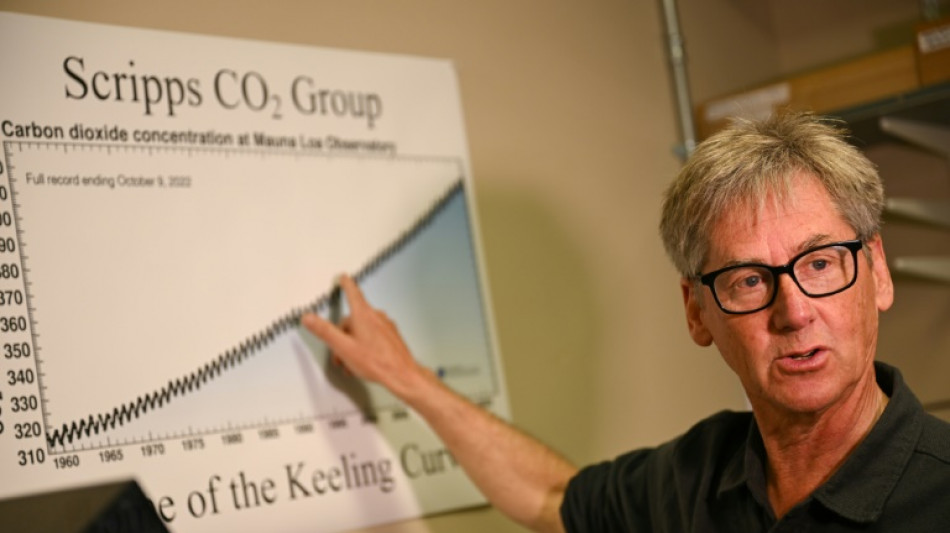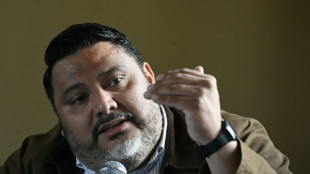
-
 Morocco part company with coach Regragui as World Cup looms
Morocco part company with coach Regragui as World Cup looms
-
Lens beat Lyon on penalties to reach French Cup semis

-
 El Salvador's Bukele holding dozens of political prisoners: rights group
El Salvador's Bukele holding dozens of political prisoners: rights group
-
With Iran war, US goes it alone like never before

-
 Spurs slip deeper into relegation trouble after loss to Palace
Spurs slip deeper into relegation trouble after loss to Palace
-
European, US stocks back in sell-off mode as oil prices surge

-
 Pete Hegseth: Trump's Iran war attack dog
Pete Hegseth: Trump's Iran war attack dog
-
Celtics' Tatum could make injury return on Friday

-
 'Enemy at home': Iranian authorities tighten grip as war rages
'Enemy at home': Iranian authorities tighten grip as war rages
-
Bethell set for 'hell of a career', says England captain Brook

-
 France coach Galthie slams Scotland for 'smallest changing room in the world'
France coach Galthie slams Scotland for 'smallest changing room in the world'
-
Medvedev arrives in Indian Wells after being stranded in Dubai

-
 Trump fires homeland security chief Kristi Noem
Trump fires homeland security chief Kristi Noem
-
Mideast war risks pulling more in as conflict boils over

-
 Wales' James Botham 'sledged' by grandfather Ian Botham after Six Nations error
Wales' James Botham 'sledged' by grandfather Ian Botham after Six Nations error
-
India hero Samson eyes 'one more' big knock in T20 World Cup final

-
 Britney Spears detained on suspicion of driving while intoxicated
Britney Spears detained on suspicion of driving while intoxicated
-
Grooming makes Crufts debut as UK dog show widens offer

-
 Townsend insists Scots' focus solely on France not Six Nations title race
Townsend insists Scots' focus solely on France not Six Nations title race
-
UK sends more fighter jets to Gulf: PM

-
 EU to ban plant-based 'bacon' but veggie 'burgers' survive chop
EU to ban plant-based 'bacon' but veggie 'burgers' survive chop
-
Leagues Cup to hold matches in Mexico for first time

-
 India reach T20 World Cup final after England fail in epic chase
India reach T20 World Cup final after England fail in epic chase
-
Conservative Anglicans press opposition to Church's first woman leader

-
 Iran players sing anthem and salute at Women's Asian Cup
Iran players sing anthem and salute at Women's Asian Cup
-
India beat England in high-scoring T20 World Cup semi-final

-
 Mideast war traps 20,000 seafarers, 15,000 cruise passengers in Gulf
Mideast war traps 20,000 seafarers, 15,000 cruise passengers in Gulf
-
Italy bring back Brex to face England

-
 French policeman to be tried over 2023 killing of teen
French policeman to be tried over 2023 killing of teen
-
Oil prices rise, stocks slide as Middle East war stirs supply concerns

-
 More flights take off despite continued fighting in Middle East
More flights take off despite continued fighting in Middle East
-
Ukraine, Russia free 200 POWs each

-
 Middle East war halts work at WHO's Dubai emergency hub
Middle East war halts work at WHO's Dubai emergency hub
-
Paramount's Ellison vows CNN editorial independence

-
 US says attacks on alleged drug boats have spooked traffickers
US says attacks on alleged drug boats have spooked traffickers
-
Dempsey returns as Scotland shuffle pack for Six Nations clash against France

-
 India pile up 253-7 against England in T20 World Cup semi-final
India pile up 253-7 against England in T20 World Cup semi-final
-
Wary Europeans pledge 'defensive' military aid in Mideast war

-
 Seven countries to boycott Paralympics ceremony over Russia: organisers
Seven countries to boycott Paralympics ceremony over Russia: organisers
-
UK's Crufts dog show opens with growing global appeal

-
 PSG prepare for Chelsea clash with Monaco rematch
PSG prepare for Chelsea clash with Monaco rematch
-
Google opens AI centre as Berlin defends US tech reliance

-
 Second Iranian ship nears Sri Lanka after submarine attack
Second Iranian ship nears Sri Lanka after submarine attack
-
Portugal mourns acclaimed writer Antonio Lobo Antunes

-
 Union loses fight against Tesla at German factory
Union loses fight against Tesla at German factory
-
Wales revel in being the underdogs, says skipper Lake

-
 German school students rally against army recruitment drive
German school students rally against army recruitment drive
-
Wary European states pledge military aid for Cyprus, Gulf

-
 Liverpool injuries frustrating Slot in tough season
Liverpool injuries frustrating Slot in tough season
-
Real Madrid will 'keep fighting' in title race, vows Arbeloa


Climate watchers fret over Trump's cut to sciences
In his California laboratory, Ralph Keeling examines a graph created from data his father began collecting that keeps a record of the amount of carbon dioxide in the atmosphere.
After 67 years, the fate of this "major indicator of climate change" is uncertain under President Donald Trump's administration.
The United States "needs this information, there's no doubt about it," the geochemistry professor at the Scripps Institution of Oceanography in San Diego told AFP.
His father, Charles David Keeling, decided in 1958 to measure atmospheric CO2 concentrations at the summit of the Mauna Loa volcano in Hawaii.
This gave rise to the Keeling curve, which today represents the oldest continuous measurement of this greenhouse gas, which is produced by the burning of fossil fuels.
This graph "showed early on that humans were having an impact on the whole planet," even before the effects of climate change were palpable, Ralph Keeling said.
Even as science as evolved, the project remains an essential climate watchdog.
It provides a basis for thinking about how farmers can modify their crops in the face of a warming atmosphere, or how insurers can adapt their coverage to cope with increasingly fierce fires and more frequent flooding.
"This is very rock solid data, but the program that makes this is fragile," Keeling said.
- 'Concerning' -
Concerns arose in early March, when Elon Musk's so-called Department of Government Efficiency recommended canceling the lease on the National Oceanic and Atmospheric Administration (NOAA) office in Hawaii by the end of August.
This office, located in the town of Hilo, is responsible for maintaining the measurements at the summit of Mauna Loa.
But it's not just buildings. NOAA, a key agency for American climate research, has been targeted by hundreds of layoffs since the return to the White House of Trump, who has repeatedly called climate change a "hoax".
The administration also wants to cut the agency's budget by $1.6 billion, according to documents revealed in mid-April by The New York Times.
The plan also envisages eliminating the branch dedicated to oceanic and atmospheric research.
"It's concerning," said Keeling.
At the summit of Mauna Loa, an observatory houses machines from the Scripps Institute and NOAA, which simultaneously measure atmospheric CO2 concentrations at an altitude of 3,400 meters (11,000 feet).
To ensure they're working properly, local scientists also regularly collect air samples in glass carboys, following the method developed by Charles Keeling more than six decades ago in San Diego.
Since then, other countries have begun recording the amount of CO2 in the atmosphere, thanks to new methods sometimes involving satellites.
But these alone are not enough, according to Keeling.
"Although there's a bigger community now, and there's a constellation of methods being used, those additional efforts have assumed that this backbone from Scripps and NOAA is there," he said.
"A satellite measurement of CO2... gives you a lot of fine grained information, but it doesn't give you reliable long term trends, and it doesn't give you certain other measures that we can get from direct atmospheric measurements.
"You have to ground truth it, you need the calibration."
- Attack on climate science -
NOAA declined to comment on the potential impact of the proposed cuts on its program.
"We are not discussing internal management matters and we do not do speculative interviews," the agency told AFP.
"NOAA remains dedicated to its mission, providing timely information, research, and resources that serve the American public and ensure our nation's environmental and economic resilience."
For Tim Lueker, who spent his career with the atmospheric measurement program launched by the Scripps Institute, that is cold comfort.
The Trump administration "is not making these cuts to save money. It's so transparent what's going on," he said.
At 67, he is worried about a full-scale attack on climate science, with the government ordering the NOAA to identify funding for projects that mention the terms "climate crisis," "clean energy," "environmental quality," or "pollution."
"The idea of saving money... is kind of silly when you consider how much one fighter plane costs compared to the annual funding of NOAA Climate Research."
H.Gerber--VB



